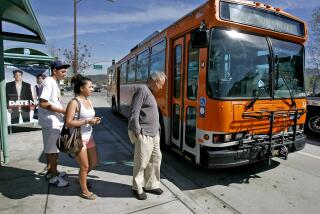Trouble at the RTD
- Share via
The extraordinarily high rate of absenteeism among bus drivers for the Southern California Rapid Transit District raises serious questions that have not been answered adequately either by management or by the union representing the drivers. These revelations follow closely on accidents involving bus drivers accused of drug abuse, and underscore concern about some of the drivers’ sense of responsibility.
A new audit has revealed that drivers, on average, are not available for duty 36 days a year, exclusive of vacation time, with lost time equal to 16.2% of the 260-day work year. Furthermore, the audit found that disability payments are increasing rapidly, with payments for worker compensation last year almost double the 1982 total.
RTD managers say that they are handicapped in addressing the problem because of contract agreements with the union circumscribing disciplinary action. A driver is permitted up to six days of absenteeism in three months before facing any formal action, and even then the RTD gives only a warning.
The RTD has sought to provide incentives to reduce the absenteeism, but the result clearly is disappointing. Only now is it preparing to implement a home monitoring program for apparent abusers of what they call the “no-fault absenteeism system,” and a computerized information system to permit tracking of patterns of abuse.
The auditors concluded that the RTD contract provisions are unusually generous, but they also found that other transit systems do better on absenteeism--at least in part because they are more aggressive in enforcing work rules. Clearly, more stick is needed along with the carrot.
Union leaders were attending a convention when the audit was released, so there has been no comment on the details of the report. A union spokesman has acknowledged that there is a problem with absenteeism, but he argued that a “significant reason” is the cutback in service that has led to overworking. That is not a satisfactory response. The drivers average 42 hours a week, the great majority earning overtime. But that hardly justifies absenteeism that exceeds the national average by 21%, even though pay in the RTD ranks among the highest in the nation.
The region is not getting its money’s worth from the transport system. The RTD management has been slow to respond to the problem, too passive in using the authority left it by a union contract that in some respects ignores the public-service responsibility. But without a new sense of responsibility on the part of the drivers, significant improvement of the situation is not likely.
More to Read
Sign up for Essential California
The most important California stories and recommendations in your inbox every morning.
You may occasionally receive promotional content from the Los Angeles Times.













